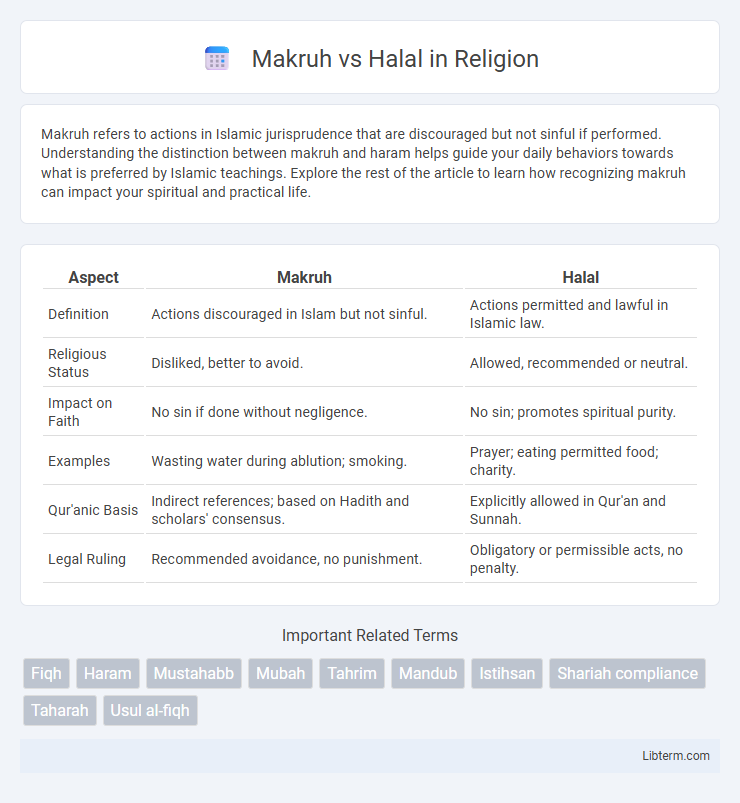Makruh refers to actions in Islamic jurisprudence that are discouraged but not sinful if performed. Understanding the distinction between makruh and haram helps guide your daily behaviors towards what is preferred by Islamic teachings. Explore the rest of the article to learn how recognizing makruh can impact your spiritual and practical life.
Table of Comparison
| Aspect | Makruh | Halal |
|---|---|---|
| Definition | Actions discouraged in Islam but not sinful. | Actions permitted and lawful in Islamic law. |
| Religious Status | Disliked, better to avoid. | Allowed, recommended or neutral. |
| Impact on Faith | No sin if done without negligence. | No sin; promotes spiritual purity. |
| Examples | Wasting water during ablution; smoking. | Prayer; eating permitted food; charity. |
| Qur'anic Basis | Indirect references; based on Hadith and scholars' consensus. | Explicitly allowed in Qur'an and Sunnah. |
| Legal Ruling | Recommended avoidance, no punishment. | Obligatory or permissible acts, no penalty. |
Understanding Islamic Dietary Laws
Makruh refers to actions or foods discouraged in Islamic dietary laws but not sinful if consumed, while halal strictly denotes what is permissible and lawful according to Shariah. Understanding these classifications helps Muslims make informed choices, emphasizing adherence to halal for spiritual and legal compliance. Islamic scholars define specific criteria for halal, including the method of animal slaughter and ingredient composition, distinguishing it clearly from makruh items.
Defining Makruh: Meaning and Implications
Makruh, in Islamic jurisprudence, refers to actions that are discouraged or disliked but not strictly forbidden, representing a middle category between permissible (halal) and prohibited (haram). The term originates from the Arabic root "karh," meaning detestation, indicating behaviors that Muslims are advised to avoid to maintain spiritual purity and legal compliance. While performing makruh acts does not incur sin, abstaining from them is rewarded, emphasizing the importance of intention and caution in adhering to halal guidelines.
What Does Halal Truly Mean?
Halal truly means permissible according to Islamic law, encompassing food, behavior, and lifestyle practices that align with Quranic guidelines and Hadith teachings. It ensures that products or actions are free from components and practices forbidden (haram), promoting purity, safety, and ethical treatment. Understanding halal involves recognizing its emphasis on cleanliness, lawful sources, and intentional compliance with Islamic principles.
Key Differences Between Makruh and Halal
Makruh refers to actions discouraged in Islamic law but not sinful if performed, while Halal denotes actions explicitly permitted and considered lawful. The key difference lies in the permissibility status; Halal acts are commendable and rewarded, whereas Makruh acts are better to avoid to maintain spiritual purity. Understanding these distinctions is essential for practicing Muslims to align their behavior with Islamic teachings accurately.
Examples of Makruh Foods and Practices
Makruh foods include those with doubtful purity or ingredients like alcohol traces or excessive artificial additives that are not strictly forbidden but discouraged due to potential harm. Examples of makruh practices involve eating garlic or onions before attending communal prayers because their strong odors may disturb others and consuming stale or leftover food repeatedly without proper preservation. Avoiding such makruh items and behaviors aligns with maintaining cleanliness, health, and respect in Islamic dietary laws.
Common Halal Food Categories
Common halal food categories include meats from animals slaughtered according to Islamic guidelines, seafood, fruits, vegetables, grains, and dairy products free from non-halal additives. Makruh foods, while not forbidden, are discouraged, such as foods prepared with questionable ingredients or methods that do not fully comply with halal standards. Understanding the distinction helps consumers choose permissible and wholesome foods in line with Islamic dietary laws.
The Role of Intention in Islamic Law
In Islamic law, the role of intention (niyyah) is crucial in distinguishing makruh (discouraged) actions from halal (permissible) ones, as the moral and legal judgment often depends on the underlying intention behind an act. Makruh acts are not sinful but discouraged, and if performed without harmful intent, they do not incur punishment, whereas halal actions are deemed lawful when accompanied by sincere and proper intention. Understanding intention helps clarify the nuanced boundaries between makruh and halal, emphasizing that actions aligned with righteous intention attain Islamic permissibility and reward.
The Impact of Makruh and Halal on Daily Life
Makruh acts as a cautionary guideline in Islamic jurisprudence, warning against actions that are discouraged but not sinful, influencing daily decisions by encouraging avoidance of borderline behaviors. Halal designates permissible actions and consumables, providing Muslims with clear boundaries to maintain spiritual purity and societal harmony. Together, the concepts shape ethical conduct, dietary habits, and lifestyle choices, impacting personal wellbeing and communal interactions.
Scholarly Opinions on Makruh vs Halal
Scholarly opinions on Makruh versus Halal categorize Makruh acts as discouraged but not sinful, whereas Halal actions are explicitly permissible and rewarded. Islamic jurists like Imam Abu Hanifa and Imam Malik emphasize that Makruh acts should be avoided to attain spiritual purity, although engaging in them does not incur punishment. The distinction serves to guide believers in maximizing their compliance with Sharia by choosing Halal practices over Makruh ones whenever possible.
Practical Tips for Choosing Between Makruh and Halal
When deciding between Makruh and Halal actions, prioritize Halal as it is explicitly permitted and rewarded in Islamic teachings, while Makruh is discouraged but not sinful. Practical tips include consulting reliable Islamic scholars or sources, avoiding doubtful matters if a clear Halal alternative exists, and emphasizing actions confirmed by Quran and Hadith to ensure compliance with Shariah. Understanding the context and intention behind choices reinforces adherence to Islamic principles, safeguarding spiritual well-being.
Makruh Infographic

 libterm.com
libterm.com